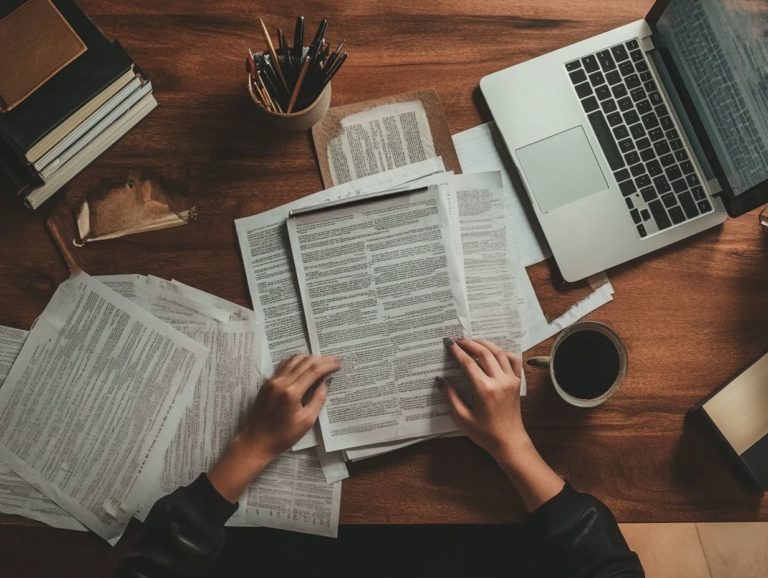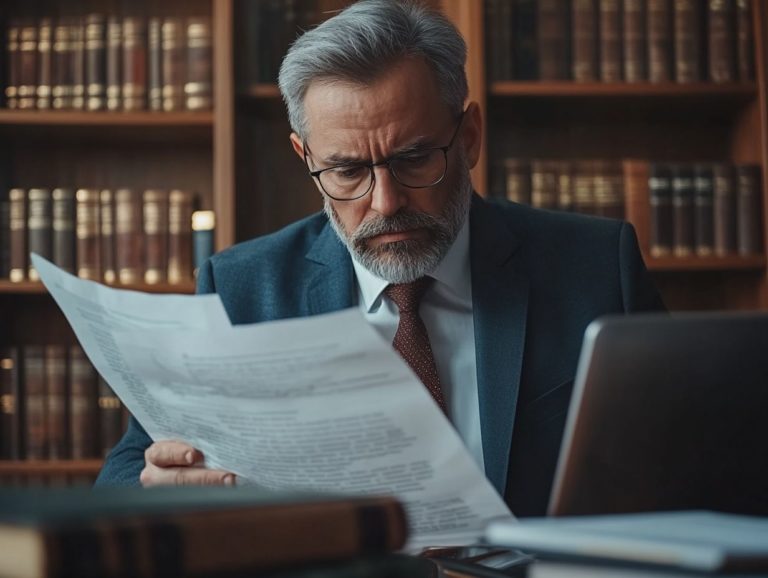Comparing Costs: Public Defender vs. Private Attorney
Selecting the right type of attorney can greatly affect the outcome of your legal matters. This article explores the key differences between public defenders and private attorneys. You’ll learn about their roles and responsibilities, as well as the services they provide.
By the end, you ll understand the costs involved and how to choose the right legal representation for your needs and budget.
Contents
- Key Takeaways:
- Understanding the Different Types of Attorneys
- What is a Public Defender?
- What is a Private Attorney?
- Cost Comparison of Public Defenders and Private Attorneys
- Pros and Cons of Each Option
- Making the Decision: Which is Right for You?
- Frequently Asked Questions
- What is the cost difference between a public defender and a private attorney?
- Why are private attorneys more expensive than public defenders?
- Hay costos ocultos asociados con la contrataci n de un abogado privado?
- El costo de un abogado privado garantiza un mejor resultado?
- Puedo solicitar un defensor p blico si no puedo pagar un abogado privado?
- Puedo cambiar de un defensor p blico a un abogado privado durante el caso?
Key Takeaways:
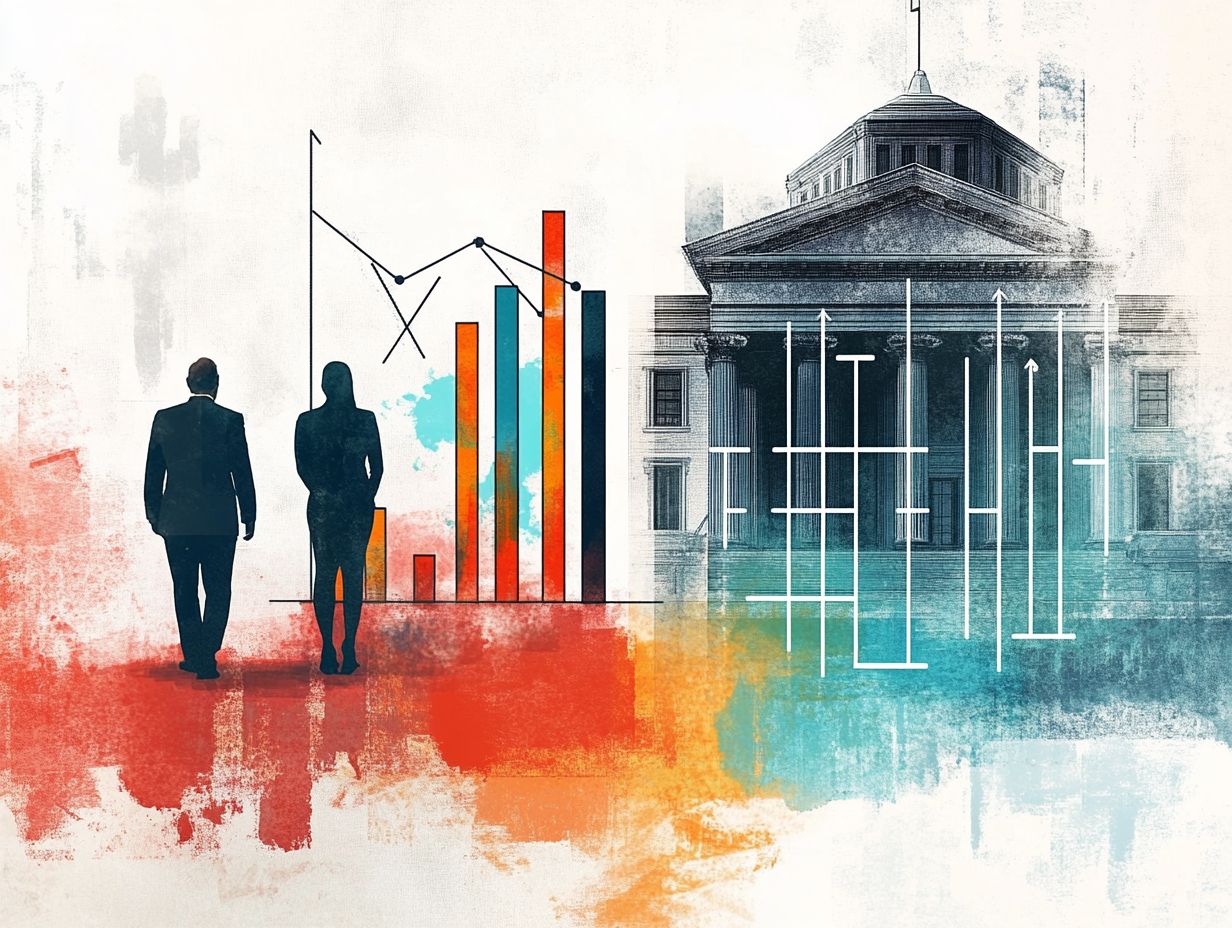
Public defenders are government-appointed lawyers who provide free legal representation to those who cannot afford a private attorney. Private attorneys offer a range of services, typically for a fee, depending on the case’s complexity.
Understanding the Different Types of Attorneys
It s vital to know the types of attorneys available. Your choice between a public defender and a private attorney can impact your case s outcome and your satisfaction with the legal process.
A public defender is assigned to individuals who cannot afford legal fees. In contrast, private attorneys offer a variety of services often at higher costs. These differences affect defense strategies, the attorney-client relationship, and the resources dedicated to your case.
Each factor plays a crucial role in trial outcomes and plea negotiations. Thus, it s essential to make an informed choice.
What is a Public Defender?
A public defender is a lawyer provided by the government for free if you can’t pay for an attorney. They ensure you have access to legal support within the criminal justice system, including federal and state courts.
Public defenders, such as those from the Dallas County Public Defender s Office or the South Carolina Commission on Indigent Defense, are committed to providing effective representation, regardless of your financial situation.
Public defenders navigate legal complexities. They use various strategies to effectively advocate for your rights. This often involves thorough investigations, pre-trial motions, and plea negotiations, all aimed at securing the best possible outcome for your case.
They also face significant challenges, such as high caseloads, which can hinder their ability to offer you the individual attention you deserve. This strain not only affects the quality of your defense but also complicates their responsibility to ensure you understand the legal proceedings.
Roles and Responsibilities
The roles and responsibilities of a public defender encompass many tasks. They provide legal representation, craft effective defense strategies, educate clients, negotiate plea bargains, and navigate courtroom dynamics all while protecting their clients’ rights.
Additionally, public defenders dedicate significant time to thorough case preparation. They analyze evidence and collaborate with experts to build a strong defense. Maintaining open communication with clients is crucial; understanding your case s nuances is vital. The attorney-client relationship forms the foundation of this process, fostering trust and transparency.
Public defenders also engage in strategic analysis, assessing the strengths and weaknesses of each case. They often utilize available defense funding to implement comprehensive legal tactics aimed at securing favorable outcomes.
What is a Private Attorney?
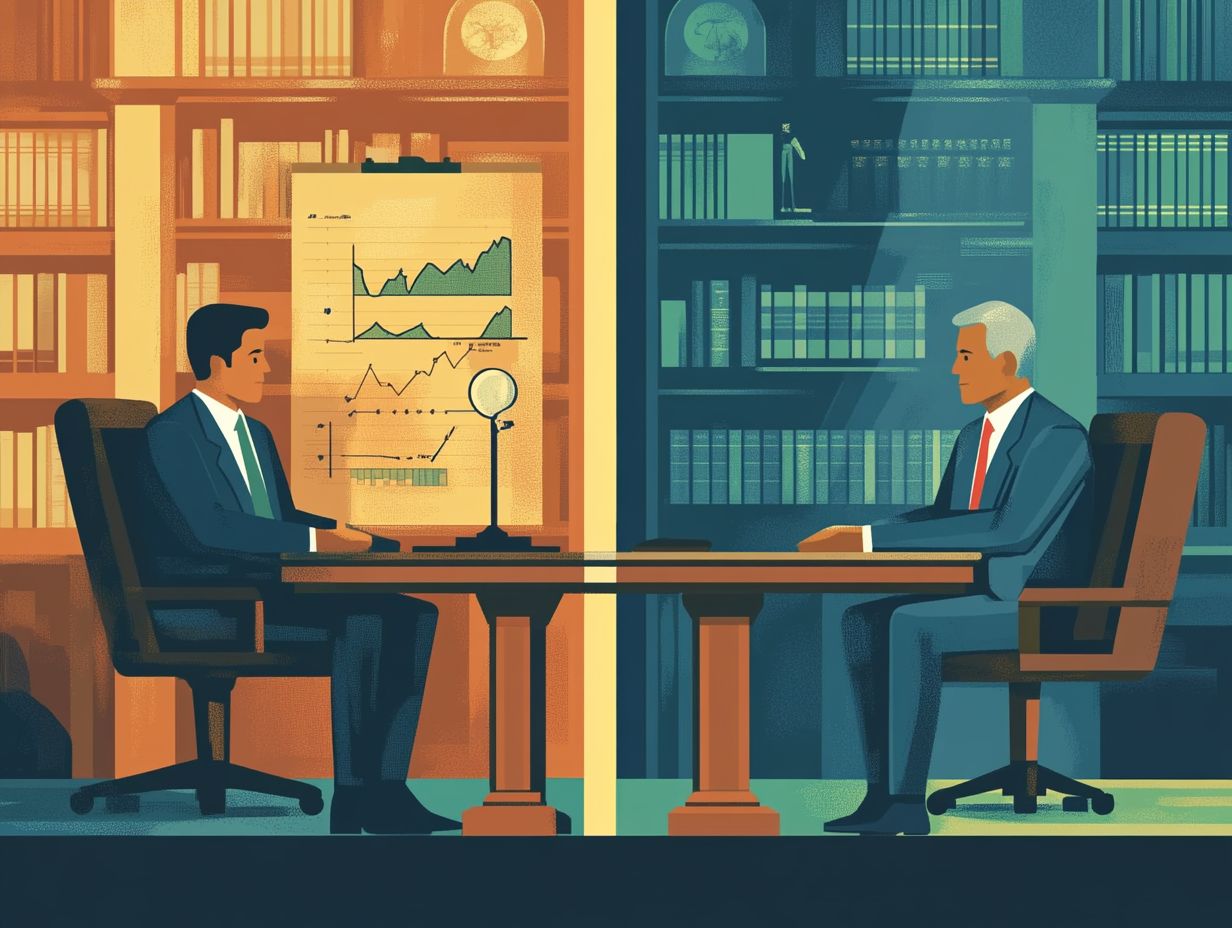
A private attorney is a legal professional you hire when you’re ready for personalized legal representation. They tailor their approach specifically to your needs in the criminal defense system.
Unlike public defenders, private attorneys can use their resources more effectively. This flexibility allows them to offer a wider range of legal strategies to improve your case outcome.
Private attorneys bring specialized expertise, ensuring they understand the law thoroughly. This knowledge enables them to craft strong negotiation strategies that can lead to better plea deals or trial results.
Public defenders handle many cases at once, which may limit their ability to focus on yours.
The financial resources available to private attorneys let them hire advanced forensic experts and conduct thorough investigations. This prioritizes your satisfaction and strengthens your legal defense.
Services Offered and Fees
Private attorneys provide a range of services that include personalized legal strategies and meticulous case preparation. Their fees can vary greatly, influenced by the complexity of your criminal defense case.
Their expertise in resource allocation can play a pivotal role in both the outcome of your case and the overall quality of your attorney-client relationship.
You should weigh the advantages of hiring an attorney with specialized qualifications against their potentially higher fees. While premier legal professionals may command a premium, their extensive experience often leads to greater client satisfaction as they adeptly manage the intricacies of your defense.
Fee structures also differ widely; some attorneys may offer flat rates or hourly billing, while others might utilize a sliding scale based on your financial situation. By understanding these financial implications, you position yourself to make informed decisions about securing the best legal representation tailored to your unique needs.
Cost Comparison of Public Defenders and Private Attorneys
When you find yourself navigating the complexities of the criminal justice system, grasping the financial differences between public defenders and private attorneys is crucial. The financial implications can profoundly influence both your legal representation and the overall outcome of your case.
Public defenders offer their services at no cost to qualifying clients, funded by government resources. In contrast, private attorneys typically charge fees that fluctuate according to their qualifications and the intricacies of the criminal charges at hand.
Understanding these options enables you to make informed decisions about your legal representation.
Factors to Consider
When weighing the decision between a public defender and a private attorney, you’ll find several critical factors that can significantly influence your choice. Consider the nature of the criminal charges you re facing, your financial resources, and the level of legal assistance you require.
Evaluating these elements provides clarity on your representation options, ensuring you receive the best possible legal support tailored to your unique circumstances. Among the most important factors to consider are the complexity of your case and the specific defense strategies needed to secure a favorable outcome.
A public defender may exhibit strong advocacy skills, yet they might be burdened with a high caseload, which could affect the personalized attention you receive. On the other hand, private attorneys often bring specialized expertise and dedicated time to the table, which can be invaluable for navigating intricate legal issues.
Understanding your attorney’s qualifications is crucial in your decision-making process, as is their method of communication. This ensures you feel informed and actively engaged in your defense, reinforcing the idea that client education is fundamental for effective representation.
Pros and Cons of Each Option
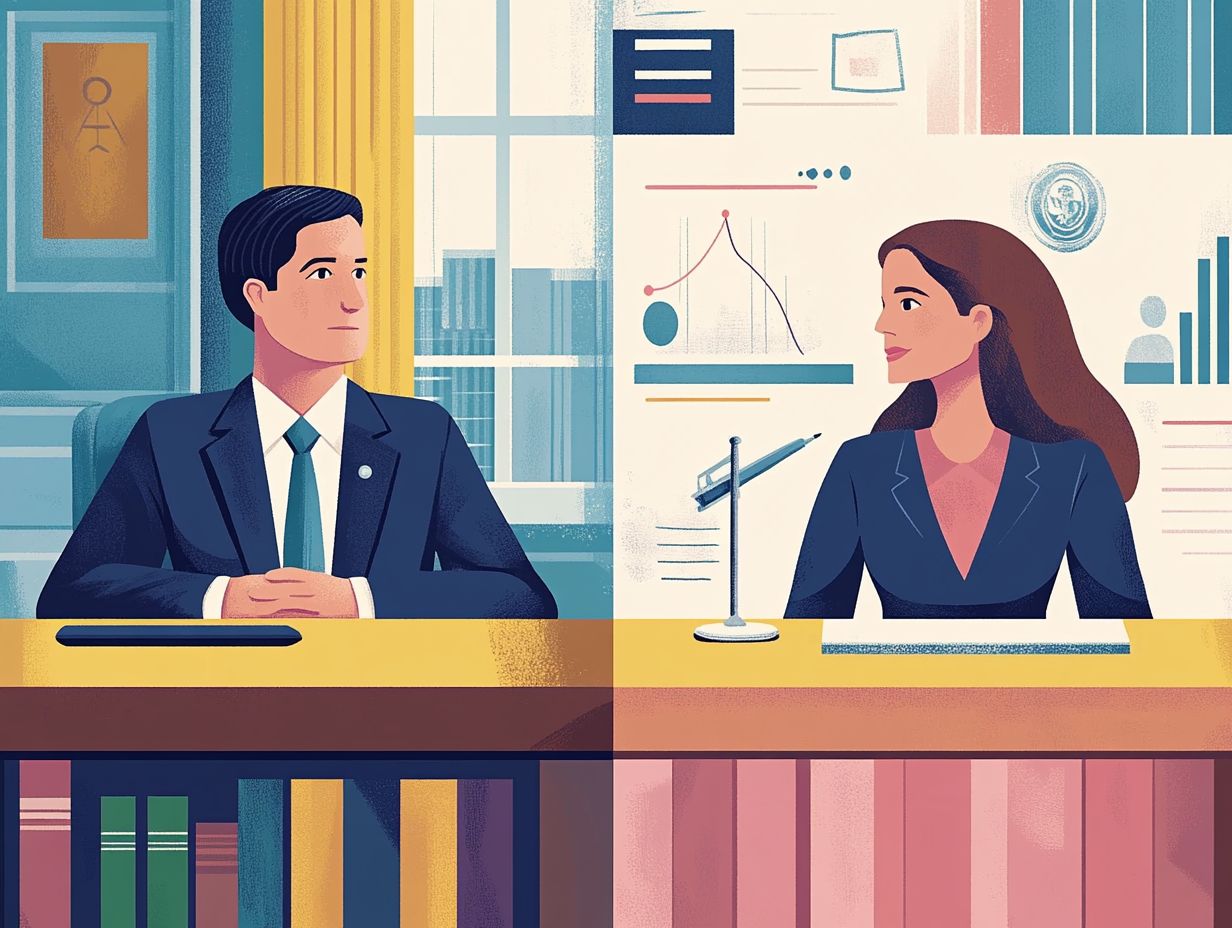
Evaluating the pros and cons of choosing a public defender versus a private attorney is essential. As a defendant, securing optimal legal representation in the criminal justice system is critical.
Public defenders typically offer their services at no cost and bring valuable experience, but they often deal with heavy caseloads. This can impact client satisfaction and trial outcomes.
On the other hand, private attorneys can tailor legal strategies to your specific needs, but their expertise comes with a financial cost.
Advantages and Disadvantages
Hiring a public defender gives you access to legal representation at no cost, along with their wealth of experience in the public defense system.
However, it’s important to recognize the trade-offs. Limited resources and potential delays due to overwhelming workloads can hinder their effectiveness.
In contrast, private attorneys offer a personalized approach and responsive communication. Yet, their services can be financially burdensome for many defendants.
This creates a complex landscape where quality can vary significantly. Public defenders often excel in navigating the system due to their extensive experience, but their heavy caseloads can leave them stretched thin.
Private attorneys, however, typically have the flexibility to tailor their advocacy closely to your needs, using negotiation techniques that align with your goals.
Yet, the costs of these services can lead to disparities in legal outcomes, impacting compliance with legal standards and shaping the resolution of your case.
Making the Decision: Which is Right for You?
Deciding whether to hire a public defender or a private attorney requires thoughtful consideration of your unique needs and budget. This choice can significantly impact the quality of your legal representation and the potential outcomes of your case.
Assess your financial resources, understand the criminal charges you re facing, and evaluate the qualifications of each attorney option. This way, you can secure the best legal support for your situation.
Assessing Your Needs and Budget
Assessing your needs and budget is an essential first step in choosing between a public defender and a private attorney. This decision will directly impact the level of legal assistance available to you and the strategies used in your defense.
Understanding the financial implications and the nature of the criminal charges can help clarify the resources required for effective representation. Evaluating these factors includes examining your eligibility for various legal services, including income thresholds for public defense.
It s crucial to consider the qualifications and experience of potential attorneys, as their expertise can significantly affect your case’s outcome.
Reflect on your financial situation to determine what you can realistically afford, whether a retainer for a private attorney or exploring pro bono options. Familiarizing yourself with negotiation strategies can empower you in discussions about fees or while seeking favorable terms.
Frequently Asked Questions
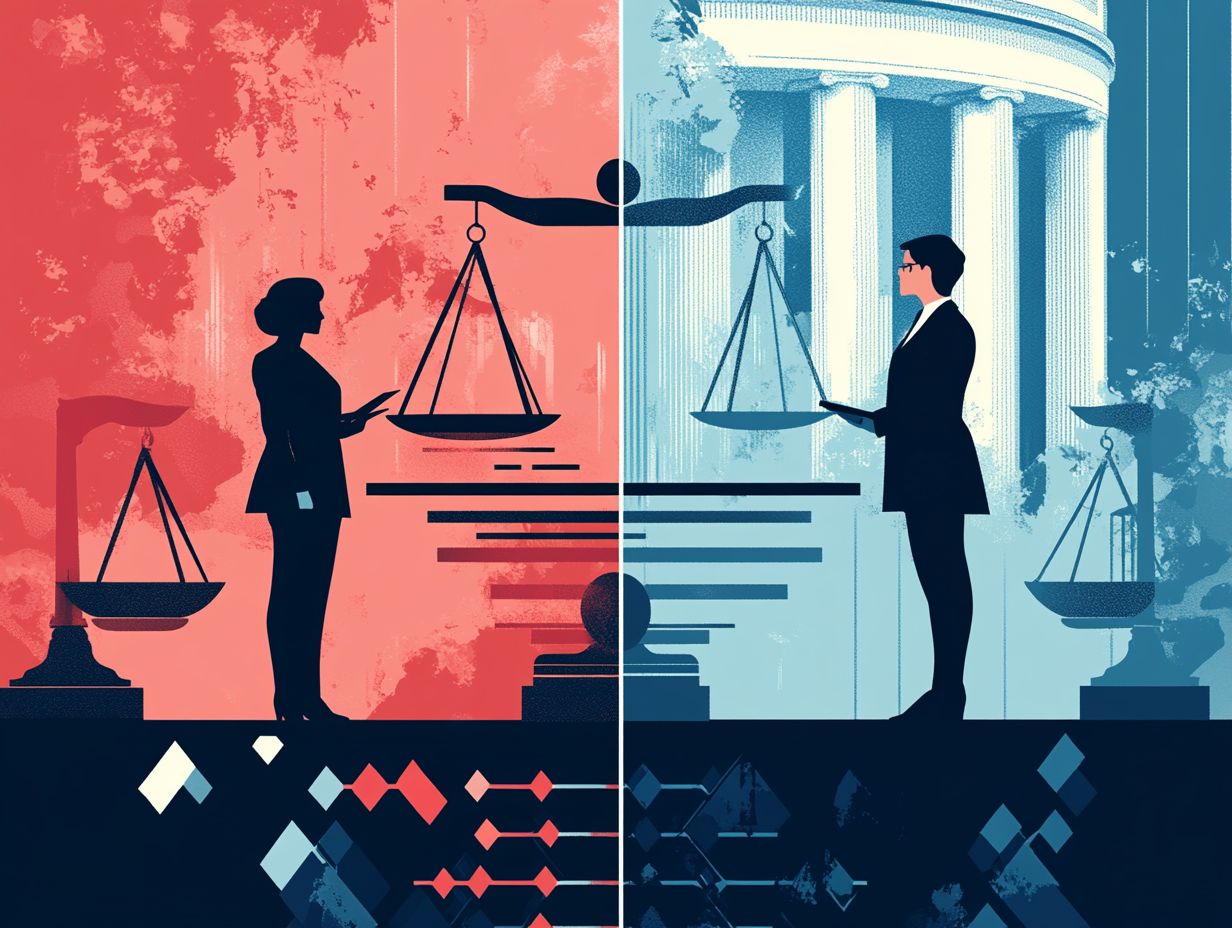
What is the cost difference between a public defender and a private attorney?
The cost of a public defender is covered by the government, while a private attorney charges fees that can range from a few hundred to thousands of dollars, depending on the case and the attorney’s experience.
Why are private attorneys more expensive than public defenders?
Private attorneys can set their own fees and often have more experience and resources, making them more expensive than public defenders who frequently face heavy workloads and limited resources.
Consider reaching out to a legal advisor to explore your options and make an informed decision!
Hay costos ocultos asociados con la contrataci n de un abogado privado?
S , los abogados privados pueden cobrar costos extra por servicios como apariciones en la corte. Tambi n pueden cobrar por la preparaci n de documentos y testimonios de testigos expertos.
Hable con su abogado sobre los costos antes de firmar cualquier cosa!
El costo de un abogado privado garantiza un mejor resultado?
No necesariamente. El resultado de un caso depende de muchos factores, como la evidencia y la decisi n del juez.
Sin embargo, un abogado privado puede tener m s tiempo y recursos para dedicar a su caso. Esto puede aumentar las posibilidades de un resultado favorable.
Puedo solicitar un defensor p blico si no puedo pagar un abogado privado?
S , si cumple con ciertos requisitos y enfrenta cargos criminales que pueden resultar en c rcel, tiene derecho a un defensor p blico. Este es un abogado que trabaja para el gobierno y no cobra al cliente.
Puedo cambiar de un defensor p blico a un abogado privado durante el caso?
S , puede cambiar a un abogado privado en cualquier momento. Pero, aseg rese de entender que puede ser responsable de cualquier costo que haya tenido con su defensor p blico hasta hacer el cambio.


